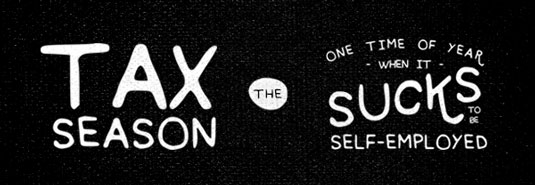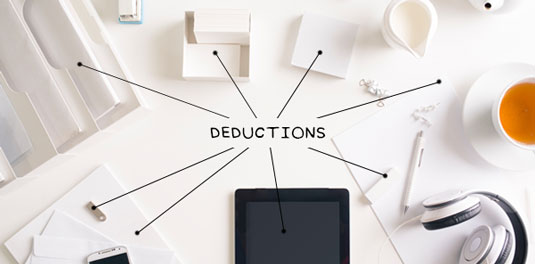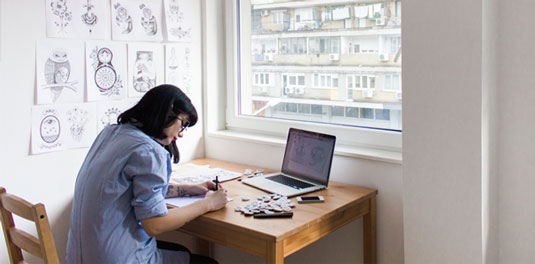3 tax tips for freelancers
Panicking about your tax return? Patrick Dodd of invoicing app Blinksale offers some pointers.

Being a freelance designer is great, but it might not seem like that right now if you live and work in the USA. Yes, income tax season is upon us: the one time a year when it truly sucks to be self-employed.
10 things nobody tells you about going freelance
Whether you're planning to tackle this beast on your own or hire a professional, it helps to have your wits about you. So here are a few things you should keep in mind as we head towards April 15...
01. Be accurate about your earnings
Freelancers are particularly prone to audits, so you don't want to make any flubs when it comes to reporting your earnings. Of course, you'll be getting 1,099 forms from your clients, but only if you did more than $600 worth of work for them during 2014.
If you've done a bunch of small-potatoes jobs this year, the government wants to know about that income. Go back through your invoices and make sure you know what you actually earned in 2014.
02. Know your deductions

Deductions are business expenses you can deduct from your taxable income. For example, if you made $60,000 last year but spent $10,000 on business expenses, you only have to pay taxes on $50,000. Make sense?
Here are the most common deductions for freelancers:
Daily design news, reviews, how-tos and more, as picked by the editors.
- Office supplies
- Books, magazines, reference materials
- Telephone/Internet service
- Promotion/advertising
- Office rent
- Gas and electric
- Memberships (professional organizations)
- Messengers, private mail carriers, postage
- Business insurance
- Tax preparation
- Travel (including cab, subway, and bus fares)
- Business meals and entertainment
- Equipment
- Software
- Business loan interest
- Legal and professional fees
- Taxes and permits
- Home office space
However, be sure to talk to your tax professional before claiming major deductions, as there are often specific stipulations for each write-off. For instance, if you're primarily working from home, you can only write off the amount of square footage that's used as a dedicated workspace.
Beware: claiming a ridiculous amount for certain deductions can trigger audits (e.g., claiming more than 20 percent of your rent/mortgage could be classified as “ridiculous”). If a deduction you're making seems unreasonable to you, chances are the government will agree.
As painful as it is, taking your time and being extremely thorough during tax season will be worth every minute. And be sure to take note of the things you wish you'd done during 2014 (been more organized, kept better records, etc) and then implement them in 2015. Time is never wasted as long as you're improving.
03. Know your forms

For some reason the government likes to give their forms extremely confusing — and extremely similar — names. Here are the ones you should probably be familiar with:
- W-9: You should have already filled out this form for the companies who hired you. Just basic info here: social security number, name, address. Not a form you're going to have to worry about now.
- 1099: This is the form your clients will send to you by late January or early February, assuming you did more than $600 worth of work for them. Again, this is a fairly simple form listing the amount of money the client paid you — also known as the amount of money you now owe taxes on.
- 1040: You'll use this form to file your income taxes. There are three different types of 1040 forms: 1040, 1040A, and 1040EZ. They are basically the same thing. The only difference is the amount of information required to fill them out. For example, the 1040EZ form doesn't allow you to claim dependents. To keep things simple, just fill out the 1040 form. It has everything you need.
Words: Patrick Dodd
Patrick Dodd is the President of Blinksale, an invoicing app designed for the small business & freelancer in mind. He's also an avid music guru, sports fan, and surfer.
Like this? Try these...
- The secrets to better client relationships
- 5 classic mistakes to avoid when approaching an agent
- The designer's guide to working from home

The Creative Bloq team is made up of a group of art and design enthusiasts, and has changed and evolved since Creative Bloq began back in 2012. The current website team consists of eight full-time members of staff: Editor Georgia Coggan, Deputy Editor Rosie Hilder, Ecommerce Editor Beren Neale, Senior News Editor Daniel Piper, Editor, Digital Art and 3D Ian Dean, Tech Reviews Editor Erlingur Einarsson, Ecommerce Writer Beth Nicholls and Staff Writer Natalie Fear, as well as a roster of freelancers from around the world. The ImagineFX magazine team also pitch in, ensuring that content from leading digital art publication ImagineFX is represented on Creative Bloq.
